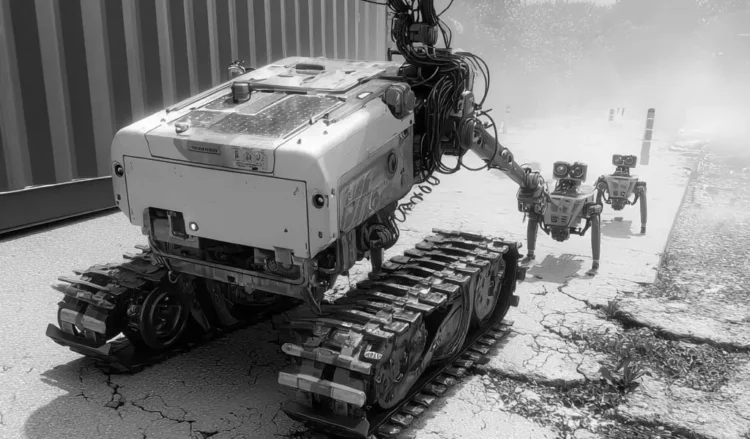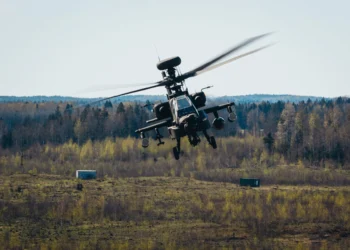BAE Systems has made a strategic investment in Oxford Dynamics, a UK startup building agentic AI and embedded systems for the space, security and defence sectors.
The British aerospace giant becomes the first external investor in Oxford Dynamics, with initial plans to embed the startup’s AI smarts into Prophesea – a platform that pulls together data from different systems to monitor assets like warships and armoured vehicles, and keep them ready for action.
Co-founder and director Shefali Sharma said that while the funding supports integration with BAE’s own systems, it also strengthens Oxford Dynamics’ ability across broader defence and national security applications.
“It’s fuel for sovereign innovation, wherever the mission leads,” Sharma told Resilience Media.
‘A very intelligent system’
Founded in 2020 by Sharma, Mike Lawton and Edward Jackson, Oxford Dynamics’ business is built around three core products. Avis (“A Very Intelligent System”) is the brains of the operation: a generative AI search and analytics platform that processes and interprets data across multiple formats in real time. Complementing this is SR-1, a sensor fusion system that embeds AVIS to speed up the military decision-making cycle known as OODA: Observe, Orient, Decide, Act. In short, it helps operators respond faster to complex threats by shrinking the time between sensing and action.
And then there is Strider, a semi-autonomous robotic system that combines rugged hardware and Oxford Dynamics’ embedded AI, built for missions in hazardous environments. So rather than sending a human in to deal with a potentially lethal situation, the operator would send Strider instead.
Combined, Oxford Dynamics’ technology meets the need for on-device AI that works reliably in harsh conditions, where connectivity is restricted. And it does so by making sense of data gleaned from sources such as drone footage, battlefield reports, and sensors to help operators respond more effectively in high-risk situations.
Today’s announcement comes a year after Oxford Dynamics secured a £1 million contract with the Ministry of Defence (MoD) to further develop Strider and get it ready for various terrains, including grass, concrete, gravel, steps and slopes.
With aerospace and defence heavyweight BAE on board as a strategic, minority investor, Oxford Dynamics now has the industrial firepower to turn prototypes into operational systems at scale.
“Our shared mission at Oxford Dynamics is to bring trusted AI to the front line, and working with BAE Systems gives us the platform to quickly scale our technology into systems that will make a real difference to our armed forces,” Jackson added in a statement.
‘Optimizing for deployment’
Up until now, Oxford Dynamics says it has been entirely self-funded (aside from some grant money), with Sharma noting that unlike other defence startups that are “optimising for VC scale,” her company is instead optimising for “speed to deploy.”
“Our focus is on building real capability – not chasing valuations, or raising capital for the sake of it,” Sharma explained. “We’re not here to ride the hype cycle; we’re here to solve hard problems that matter. That means working collaboratively, deploying fast, and ensuring our technology strengthens the resilience of the UK and its allies.”
Having just raised an undisclosed figure from BAE, however, it’s clear that funding is an integral component for any fledgling defence tech startup. Indeed, Sharma notes that Oxford Dynamics remains a “fully independent company” in the wake of BAE’s investment, but it’s now better positioned to bring its technology to real-world applications.
“This strategic investment marks our first external capital – and was a deliberate decision to bring on a partner who aligns with our mission to deliver capability at pace,” Sharma said.
There could be more funding down the road, too, with dedicated defence funds potential suitors.
“While our immediate focus is delivering impact through the BAE Systems partnership, we’re also planning ahead,” she said. “We’re actively exploring what a future funding round could look like – not because we need capital today, but because we know momentum compounds.”
Building battle-ready tech from home soil
The bigger story in all this is Europe’s drive to develop capabilities devoid of Big Tech dependencies. It also demonstrates a prime working differently with a startup. Rather than a contractual relationship, or a straight aquisition, BAE investing sets a new framework with different incentives.
Just last week, Scottish aerospace startup Skyrora became the first U.K. company to secure a rocket launch licence, aiming to both manufacture and launch rockets from home soil. And this trend is visible across sectors, with public sector institutions shifting away from proprietary ecosystems like Microsoft’s in favour of open-source alternatives, seeking greater control and independence.
In the context of defence and security, that same shift is driving demand for home-grown AI systems that offer transparency and freedom from foreign tech influence — something that BAE Systems’ group managing director Andrea Thompson calls “sovereign defence and security.”
“The landscape of warfare is rapidly evolving and embracing emerging technology is vital to keeping the UK safe,” Thompson said. “By working with companies such as Oxford Dynamics, we can help ensure that the nation is ready to unlock the advantages that innovation brings and help strengthen the UK’s sovereign defence and security landscape.”












